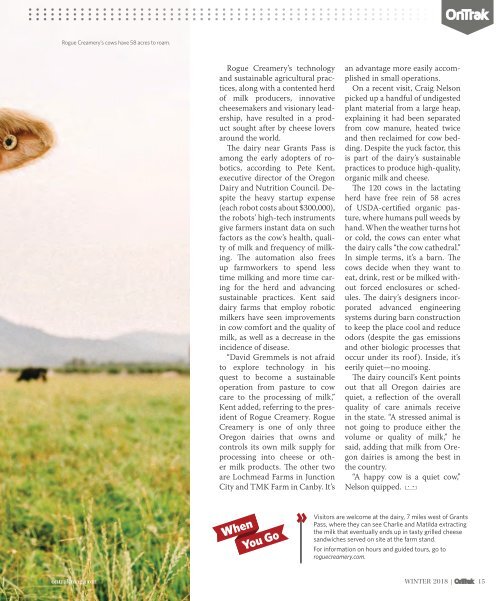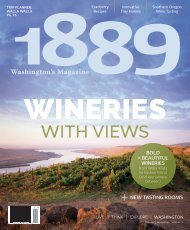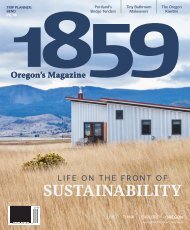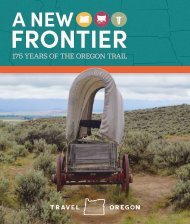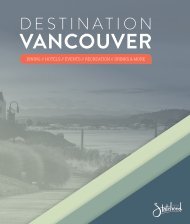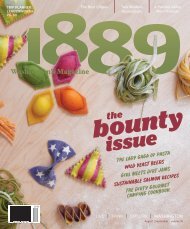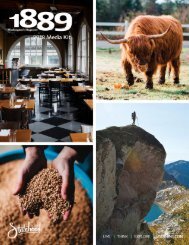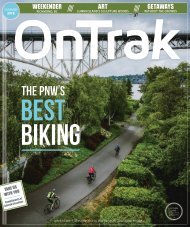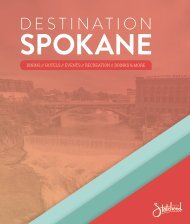Create successful ePaper yourself
Turn your PDF publications into a flip-book with our unique Google optimized e-Paper software.
Rogue Creamery’s cows have 58 acres to roam.<br />
Rogue Creamery’s technology<br />
and sustainable agricultural practices,<br />
along with a contented herd<br />
of milk producers, innovative<br />
cheesemakers and visionary leadership,<br />
have resulted in a product<br />
sought after by cheese lovers<br />
around the world.<br />
The dairy near Grants Pass is<br />
among the early adopters of robotics,<br />
according to Pete Kent,<br />
executive director of the Oregon<br />
Dairy and Nutrition Council. Despite<br />
the heavy startup expense<br />
(each robot costs about $300,000),<br />
the robots’ high-tech instruments<br />
give farmers instant data on such<br />
factors as the cow’s health, quality<br />
of milk and frequency of milking.<br />
The automation also frees<br />
up farmworkers to spend less<br />
time milking and more time caring<br />
for the herd and advancing<br />
sustainable practices. Kent said<br />
dairy farms that employ robotic<br />
milkers have seen improvements<br />
in cow comfort and the quality of<br />
milk, as well as a decrease in the<br />
incidence of disease.<br />
“David Gremmels is not afraid<br />
to explore technology in his<br />
quest to become a sustainable<br />
operation from pasture to cow<br />
care to the processing of milk,”<br />
Kent added, referring to the president<br />
of Rogue Creamery. Rogue<br />
Creamery is one of only three<br />
Oregon dairies that owns and<br />
controls its own milk supply for<br />
processing into cheese or other<br />
milk products. The other two<br />
are Lochmead Farms in Junction<br />
City and TMK Farm in Canby. It’s<br />
an advantage more easily accomplished<br />
in small operations.<br />
On a recent visit, Craig Nelson<br />
picked up a handful of undigested<br />
plant material from a large heap,<br />
explaining it had been separated<br />
from cow manure, heated twice<br />
and then reclaimed for cow bedding.<br />
Despite the yuck factor, this<br />
is part of the dairy’s sustainable<br />
practices to produce high-quality,<br />
organic milk and cheese.<br />
The 120 cows in the lactating<br />
herd have free rein of 58 acres<br />
of USDA-certified organic pasture,<br />
where humans pull weeds by<br />
hand. When the weather turns hot<br />
or cold, the cows can enter what<br />
the dairy calls “the cow cathedral.”<br />
In simple terms, it’s a barn. The<br />
cows decide when they want to<br />
eat, drink, rest or be milked without<br />
forced enclosures or schedules.<br />
The dairy’s designers incorporated<br />
advanced engineering<br />
systems during barn construction<br />
to keep the place cool and reduce<br />
odors (despite the gas emissions<br />
and other biologic processes that<br />
occur under its roof). Inside, it’s<br />
eerily quiet—no mooing.<br />
The dairy council’s Kent points<br />
out that all Oregon dairies are<br />
quiet, a reflection of the overall<br />
quality of care animals receive<br />
in the state. “A stressed animal is<br />
not going to produce either the<br />
volume or quality of milk,” he<br />
said, adding that milk from Oregon<br />
dairies is among the best in<br />
the country.<br />
“A happy cow is a quiet cow,”<br />
Nelson quipped.<br />
When<br />
You Go<br />
Visitors are welcome at the dairy, 7 miles west of Grants<br />
Pass, where they can see Charlie and Matilda extracting<br />
the milk that eventually ends up in tasty grilled cheese<br />
sandwiches served on site at the farm stand.<br />
For information on hours and guided tours, go to<br />
roguecreamery.com.<br />
ontrakmag.com WINTER <strong>2018</strong> | 15


